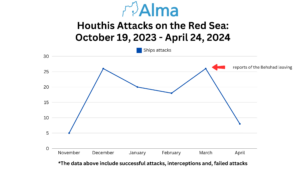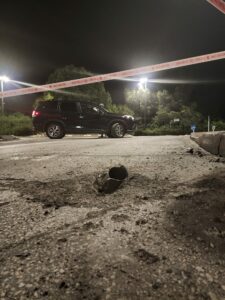[vc_row][vc_column][vc_column_text]The Jerusalem Marathon that took place this weekend was attended by 30 thousand runners, including about 2,600 from abroad. Hosting the marathon despite daily terrorist attacks in recent months, is a good example of the Israeli mentality of maintaining normal life, despite the complex social and security challenges we face. Two weeks ago, Taylor Force, a tourist from the United States was killed in the center of Tel Aviv-Jaffa in a stabbing attack in which 11 others were injured. This is an exceptional incident by location and extent, but the stabbing and running over of Israelis by Palestinians have become a daily reality in recent months.
Another thing that has become routine is the response of the Palestinian leadership and media to these incidents. Palestinian Authority President, Mahmoud Abbas, has conveyed his condolences to Vice President Biden, who was visiting Israel and the PA that day. Abbas made it clear many times in recent years that he objects violent activities as a part of the Palestinian struggle for independence. He led, sometimes very bravely, a different way of fighting Israel, Opting for “soft” activities that are meant to damage its legitimacy, aimed at the international arena. Palestinian security forces have continued, over the years, to cooperate with the IDF in the fight against terrorism and it seemed that Abbas is fundamentally different from Arafat.
Yet, Abbas seems reluctant to take the next step, failing to prevent and stop propaganda that promotes violence against Israel by the Palestinians. Palestinian media glorifies the stabbers, turning them into martyrs (Shahids) that are being commemorated in various ways (monuments, memorial ceremonies and official sports competitions), and their legacy is taught in Palestinian schools. At the center of the Palestinian discourse stand the martyrs and martyrdom, victims and self-sacrifice. “A martyr who her soul watered the blood of Palestinian land”- Abbas giving a speech, consoling Amani al-Sbatin’s family, who died trying to run over soldiers at Gush Etzion junction, on March 4th.
There are countless other examples: the official Facebook page of Fatah, praised the terrorist acts of March 8, and Taylor’s murderer. On Fatah day celebrated each year on January 1st, during a parade in the city of Bethlehem, children came out wearing explosive belts. Ramallah’s News Agency released the news of Taylor’s death under the title “Participated in the occupation of Iraq and therefore was killed in Jaffa”, and on the Facebook page of the agency it was added (gaining thousands of Likes): “Taylor paid the price for his crimes in Iraq at the hands of the martyr Mazalcha in Jaffa”. At the same time, Palestinian civil society organizations, some of which receive funding from Western countries and the European Union, expressed support of the attacks and those who committed them, and incited violence under slogans such as “don’t put down your guns”. These organizations arranged memorial ceremonies and commemorative events as part of the “industry” for supporting the terrorists. This ethos of becoming a martyr which Palestinian children are raised to believe in, is also fuelled by the attacks themselves. Each attack leads to more children wanting to attack Israelies. As Hamas stated after Taylor’s murder “the martyrs’ blood will fuel the escalation”.
What do they want?
These children are taught that terror attacks will help in achieving two goals: Firstly, the struggle against the occupation, but in reality said attacks promote non-recognition of the Palestinians in Israel. This is reflected, for example, in the use of the term “settlers” by Palestinian media, not only for the residents of Judea and Samaria as we would like to think, but also, for Israelis in general. Thus, Palestinian television reported, all casualties of the attack in Tel Aviv on March 8th, are settlers, “including an American tourist.” More than that, Quds News Agency in Ramallah even claimed that Taylor was working for a security company and that his mission in visiting the “State of Occupation” might have been for “security rather than tourism”.
The second goal is not national, but religious. Two days before he killed Taylor, the murderer, Bashar Mazalcha returned from the Muslim pilgrimage (Umra) in Saudi Arabia. We don’t know exactly what messages he heard there that made him run wild in the streets of Tel Aviv upon his return, but there is no doubt that the events of recent months in Israel are the result of exploiting religious sentiments for the purpose of a national struggle. The Israeli-Palestinian conflict is been islamicated through a campaign that has been led by political leaders and clerics in the Arab world for years. The libel “Al-Aqsa is in danger” or “the mosques in Jerusalem are at danger”, is rooted deeply in these societies in a way that strongly reminds us of the anti-Semitic libels in Europe 150 years ago.Academic research, educational programs, and alleged archaeological evidences are all in use in this campaign, which claims that Israel wants to destroy the mosques and build the third temple in their place.
Last summer, just before the outbreak of this “Stabbers Intifadah”, as part of this campaign, Israel was accused of breaching the status quo on Temple Mount. The Status Quo on the Temple Mount is a document that was created after the liberation of Jerusalem in 1967 and designed by the Defense Minister, Moshe Dayan. According to the document, after Israel captured the Temple Mount it returned, voluntarily, the control of the complex to the Muslim Waqf. The Waqf is an Islamic institute that controls all the holy Muslim sites around the world. So, these places are not owned by any government or private institute, rather belonging to a religious institution. At the same time, in the peace agreements with Jordan, Israel officially recognized Jordan’s linkage and historical patronage of the Temple Mount. According to the Status Quo document Jews can visit the Temple Mount, but are not allowed to pray there.
A movement that aims to allow Jewish prayer on the Temple Mount has been developed in Israel, but the Israeli government has made it clear that it does not intend to change the Status Quo in Jerusalem. Palestinian accusations that Israel violates the Status Quo in Jerusalem were based on Netanyahu’s government policies, which enable Jews to enter the Temple Mount as part of the freedom of religion, without giving them the right to pray, even though this is the holiest place for Jews.
On September 11, 2015 Sheikh Raed Salah, head of the northern branch of the Islamic Movement in Israel, delivered a speech for the twentieth anniversary of the festival “Al-Aqsa in Danger” that is held each year in Umm al-Fahm in the Galilee. In this speech, and not for the first time, Saleh described Jerusalem as the capital of the future Islamic Khaliphate (Despite the fact that the holiest city in Islam is Mecca, in Saudi Arabia). Sheikh Saleh called his people to establish National Guard committees in Jerusalem, claiming that the Israeli occupation prepares for a mass break into Al-Aqsa mosque in the coming days, and called to “save” the mosque. The wave of terror begun several weeks later. Some mark its beginning with the first stabbing in the alleys of Jerusalem, where the murderer Mhand Halabi, fatally stabbed two Israelis (October 3th). The victim’s wife ran through the alley, screaming “save my babies”, but was met with indifference on the part of the Arab merchants who had been watching the gruesome scene unfold, one of them continued to drink his Coke.
Bottom line, the sense that the Israeli-Palestinian conflict is the cause for restlessness in the Middle East and terrorism in the West was disproven by the civil war in Syria, which demonstrated that there is no connection between the national conflict taking place here and the religious-cultural struggle Islamic extremists are trying to produce around the world.The Israeli-Palestinian conflict does not fuel global terrorism, but on the contrary, global terrorism, and Sunni extremist ideologies nourished by Al-Qaeda and thereafter ISIS are encouraging terrorists to rampage in the streets of Tel Aviv. As we have learned from other parts of the world, it does not necessarily mean that the terrorists are ISIS members or even commands received from the organization. But we can certainly say that some of them are inspired by the ISIS ideas and modus operandi. The era of “the global village”, Facebook and social networking make the information very accessible and allow ISIS to spread inspiration even more.
A few words about Jewish terrorism: the fact that in Israel there are Jewish terrorist activities such as “price tag” is not relevant. Since these activities are proscribed by Israeli society, media and government and are against the law in Israel. Jewish terrorists are not considered heroes and my children are not been raised to admire them or their heritage.
Is there any hope?
Among those who were wounded in the attack in Jaffa was also a Palestinian who tried to stop the terrorist with an iron rod. Earlier, in January this year, the Middle East Media Research Institute (MEMRI) published a paper in which it described many examples of Palestinian writers who called to avoid the use of children as terrorists against Israel and to stop attacks against civilians, both for moral reasons and practical reasons, as civilian casualties reinforce the comparability of the Palestinian struggle to ISIS. The authors claimed that the Palestinian leadership merchants the blood of children “and send them to die”. Such statements, that suggest that Palestinian education brings these children to prefer death over life, give us hope. More statements like this might cause a shift in the way the PA and Palestinian parents educate their children, and make the prospect of a different reality in our region a realistic hope.Political or military solutions must therefore be held alongside the or even after the need for educating the Palestinian nation to respect others, and cherish their own lives and the lives of their children. The hope, then, is for long-distance runners, who are ready for a marathon rather than a “quick fix”.
Sources:
- terrorism-info.org.il #1
- terrorism-info.org.il #2
- washingtontimes.com
- qudsn.ps
- memri.org #1
- memri.org #2
- memri.org #3
- memri.org #4
- memri.org #5
- palwatch.org
- walla.co.il
Nadav Shragai, The “Al-Aksa Is in Danger” Libel: The History of a Lie”. Jerusalem Center for Public Affairs.
Thanks Iftah Burman for the important information delivered for this paper.[/vc_column_text][/vc_column][/vc_row]





